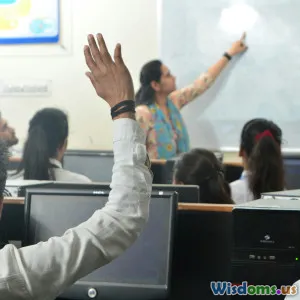
The Role of Teachers in Modern Education
5 min read Explore the essential role teachers play in shaping modern education, fostering engagement, and adapting to new challenges. (0 Reviews)
The Role of Teachers in Modern Education
In a rapidly evolving world, the role of teachers has become more significant than ever. As society shifts toward an information-rich environment, teachers are not just providers of knowledge; they are facilitators, mentors, and advocates for their students' holistic development. This article explores the multifaceted role of teachers in modern education, emphasizing their impact on student learning, emotional well-being, and adaptability to technological advancements.
1. Facilitators of Learning
In traditional educational models, teachers were often seen as the primary source of information. However, in modern education, their role has transformed into that of facilitators. This shift encourages active learning, where students engage with the material, collaborate with peers, and develop critical thinking skills. Teachers now create environments where inquiry and exploration are at the forefront.
Example: Inquiry-Based Learning
In inquiry-based learning, teachers guide students to ask questions and explore topics deeply. For instance, a science teacher might encourage students to conduct experiments and draw conclusions rather than merely memorizing facts. This approach not only enhances understanding but also promotes a love for learning.
2. Mentors and Guides
Beyond academic instruction, teachers serve as mentors, providing guidance and support to students. They help navigate the complex landscape of education, encouraging personal growth and resilience.
Emotional Support
Teachers often recognize the emotional and social challenges students face. A supportive teacher can make a significant difference in a student's life, fostering a safe space where they feel valued and understood. This emotional connection can lead to improved academic performance and overall well-being.
3. Adapting to Technology
The integration of technology in education has revolutionized teaching methods. Teachers are now tasked with not only incorporating digital tools into their lessons but also teaching students how to navigate an increasingly digital world.
Example: Blended Learning
Blended learning combines traditional classroom methods with online education. Teachers play a crucial role in designing and implementing these hybrid models, ensuring that students receive a balanced and comprehensive learning experience.
4. Advocates for Equity
Teachers are also advocates for equity in education. They work to ensure that all students have access to quality education regardless of their backgrounds. This advocacy often involves addressing systemic issues within the education system.
Example: Inclusive Classrooms
Creating inclusive classrooms where every student feels represented and supported is a pressing concern for many educators. Teachers are increasingly trained to recognize and address diverse learning needs, fostering an environment where all students can thrive.
5. Lifelong Learners
In order to effectively teach and inspire their students, teachers must also engage in lifelong learning. Professional development opportunities, peer collaboration, and self-reflection are essential for teachers to stay current with pedagogical advancements and educational research.
Continuous Improvement
Teachers who embrace lifelong learning model the importance of growth and adaptability to their students, instilling a mindset that values education beyond the classroom.
Conclusion
The role of teachers in modern education is complex and multifaceted. As facilitators of learning, mentors, advocates for equity, and lifelong learners, teachers shape not only the academic landscape but also the future of society. Their ability to adapt to new challenges and embrace technological advancements will continue to influence the educational journey of countless students. In recognizing and supporting the vital role of teachers, we can enhance the educational experience for all learners and foster a generation that is well-equipped to navigate the complexities of the modern world.
Rate the Post
User Reviews
Popular Posts





















